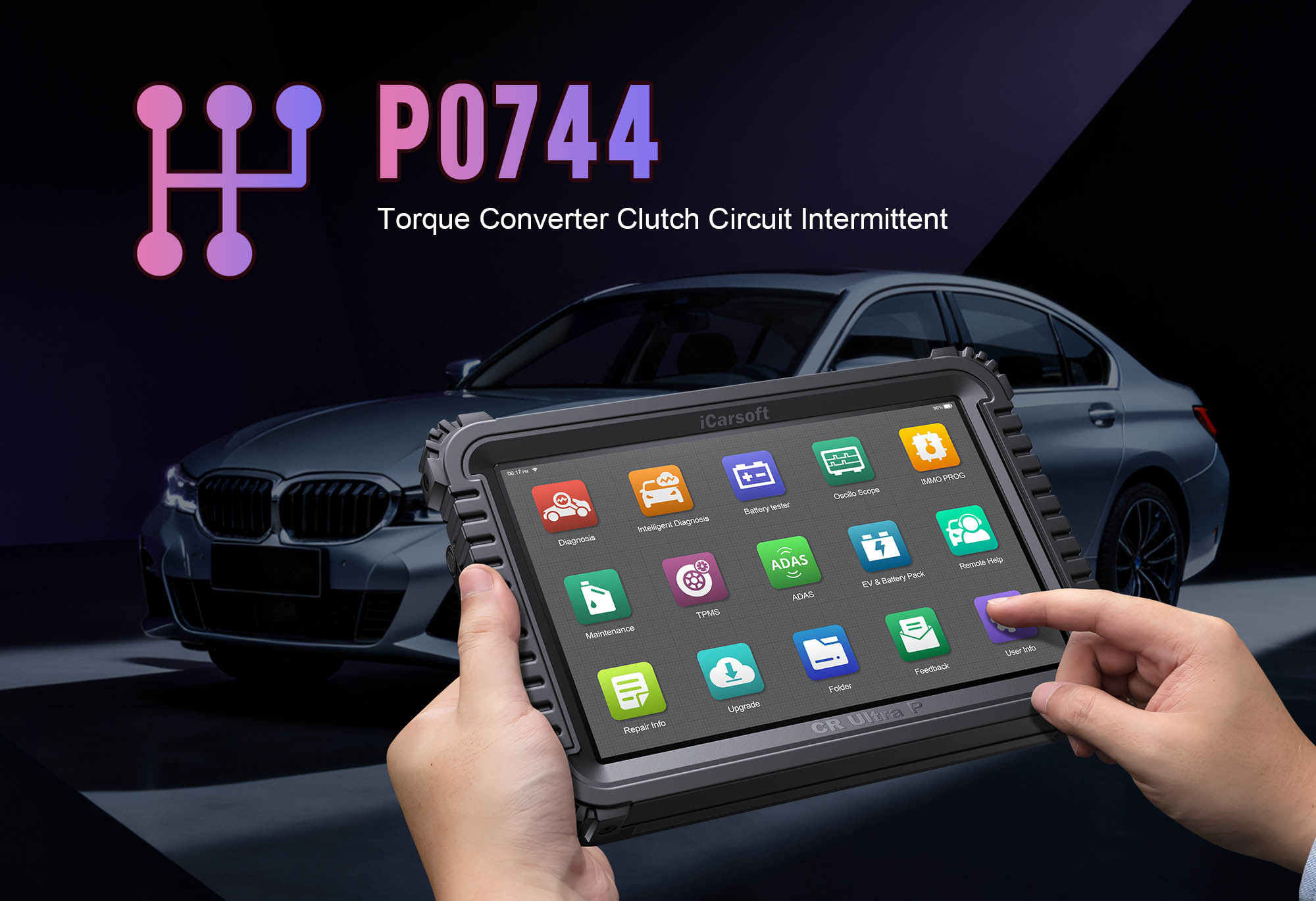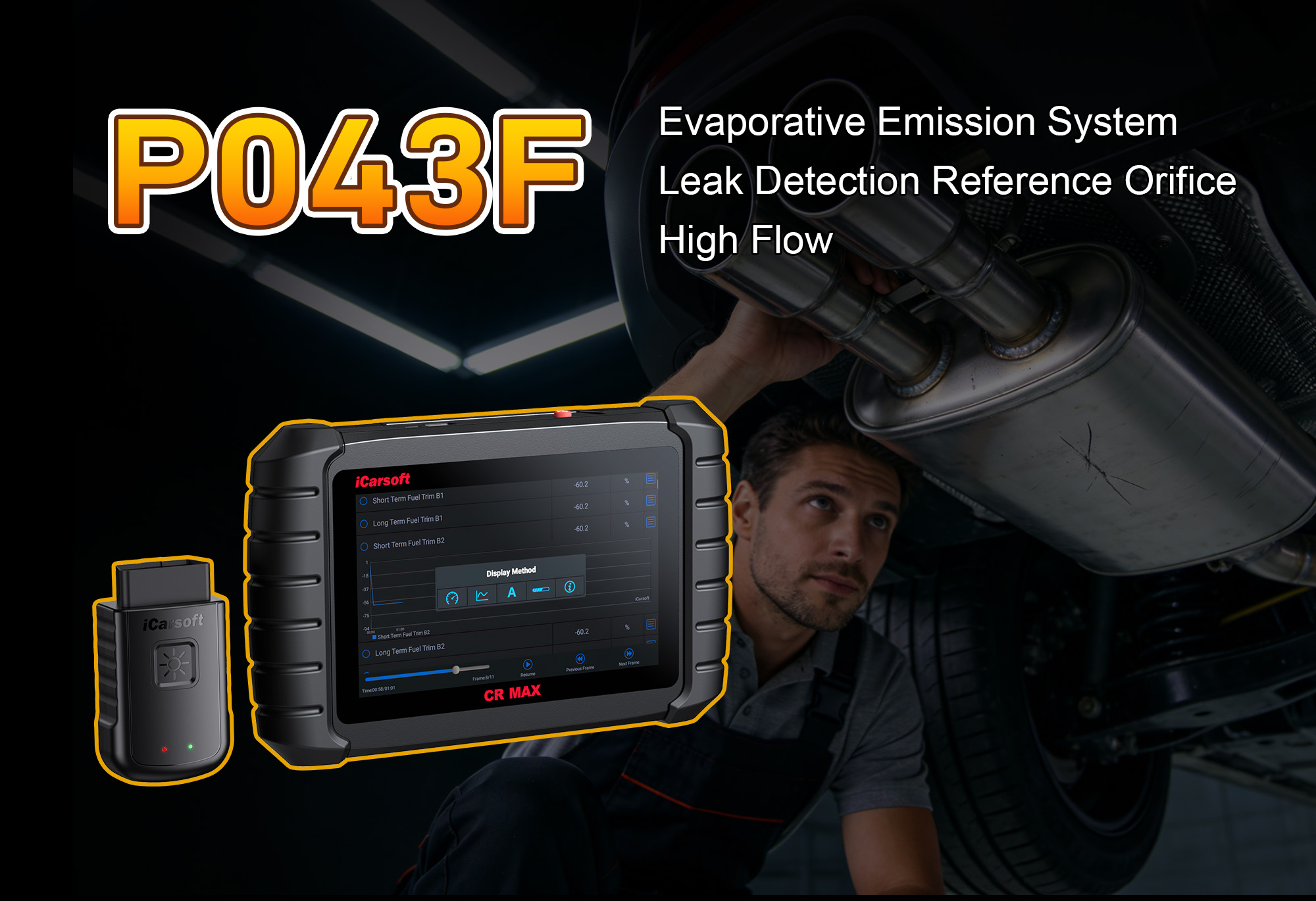Diagnose & Clear P0744 with iCarsoft CR Ultra P
If your vehicle’s transmission shudders randomly at highway speeds, fuel economy fluctuates, or the check engine light turns on and off intermittently, a diagnostic scan will likely return P0744. This OBD-II code stands for "Torque Converter Clutch (TCC) Circuit Intermittent"—a fault indicating the TCC circuit (which controls the torque converter’s lockup clutch) sends erratic, inconsistent signals to the Transmission Control Module (TCM). The TCC relies on stable electrical and hydraulic signals to engage/disengage, optimizing fuel efficiency and reducing transmission slip; intermittent disruptions cause unpredictable performance and risk long-term wear.
Basic scanners might only flag a "TCC intermittent issue" but can’t capture transient signals, test circuit continuity under load, or recalibrate the TCM—leaving you guessing between loose wiring, a failing solenoid, or corrosion. The iCarsoft CR Ultra P, with its OE-level real-time data logging, bi-directional controls, and topology mapping, solves this. Let’s break down how to diagnose and resolve P0744 with precision, using the CR Ultra P’s unique features to stabilize the TCC circuit and restore reliable performance.
Understanding P0744: Causes & Key Symptoms
The torque converter’s lockup clutch (TCC) synchronizes engine and transmission speeds at highway speeds, improving fuel economy by 5–10%. The TCM activates the TCC via a solenoid, which regulates hydraulic pressure. P0740 triggers for consistent circuit failures, while P0744 specifically indicates intermittent issues—signals that cut out, fluctuate, or return to normal randomly. These inconsistencies often worsen with temperature changes (e.g., cold starts or hot weather) or vibration (e.g., rough roads).
Key Symptoms of P0744
-
Random TCC Shudder: A brief "vibration" at 50–60 mph when the TCC engages/disengages unexpectedly.
-
Fluctuating Fuel Economy: Mileage drops suddenly (by 8–12%) when the TCC fails to lock, then improves when the circuit resets.
-
Intermittent Check Engine Light: The light illuminates during faults and turns off when the circuit temporarily normalizes.
-
Delayed or Rough Shifts: The TCM adjusts shift logic to compensate for erratic TCC signals, leading to harsh gear changes.
-
Transmission Overheating (Intermittent): Brief slip periods generate excess heat, triggering a "transmission hot" warning intermittently.
Common Causes of P0744
|
Cause
|
Description
|
|
Loose/Corroded TCC Circuit Connectors
|
The solenoid or TCM connector becomes loose, or pins corrode—disrupting signal flow only under vibration or temperature changes.
|
|
Frayed Wiring
|
Damaged wires in the TCC circuit (e.g., from rodent chewing or friction) make intermittent contact.
|
|
Failing TCC Solenoid
|
A solenoid with internal wear or partial valve sticking works occasionally but fails under load.
|
|
Low/Contaminated Transmission Fluid
|
Insufficient fluid reduces pressure, causing the TCC to engage/disengage randomly; dirty fluid clogs the solenoid valve intermittently.
|
|
TCM Intermittent Malfunction
|
Rarely, the TCM’s internal circuit for processing TCC signals glitches, leading to transient faults.
|
Why iCarsoft CR Ultra P Excels at Diagnosing P0744
Intermittent faults are harder to diagnose than consistent ones—but the CR Ultra P’s specialized features target P0744’s random nature:
Real-Time Data Logging
Captures TCC circuit voltage, solenoid status, and clutch engagement continuously—identifying transient drops or spikes even when the check engine light is off.
Bi-Directional Solenoid Testing
Activates the TCC solenoid under controlled conditions to replicate intermittent failures (e.g., vibration or temperature changes).
Transmission Topology Mapping
Visualizes the entire TCC circuit as a color-coded diagram, highlighting loose connections or frayed wires causing intermittent contact.
OE-Level Circuit Continuity Checks
Measures resistance and voltage under load (accelerating, bumpy roads) to detect issues that only appear during driving.
Global Vehicle Coverage
Supports 200+ brands and transmission types, including 2018+ models with DoIP/CAN-FD protocols.
CR Link VCI Compatibility
Seamless connectivity with modern TCMs, ensuring reliable data capture for intermittent faults.
41 Hot Service Functions
Includes TCM reset, TCC adaptation relearn, and solenoid calibration—critical for stabilizing the circuit post-repair.
Step-by-Step: Diagnose P0744 with iCarsoft CR Ultra P
-
Safety First & Initial Checks
1. Let transmission cool 2–3 hours (fluid temps exceed 250°F) to avoid burns.
2. Check fluid level & condition:
- Use Transmission > Fluid Level Check (dipstick-less) or vehicle dipstick to verify level.
- Inspect fluid: Bright red = clean; dark/cloudy/burnt = contaminated (needs flushing).
3. Locate components via Component Location > Transmission > TCC System:
- TCC Solenoid: In valve body (under transmission pan).
- TCC Circuit Connectors: Solenoid connector (on transmission) and TCM connector (under dashboard/engine bay).
- Wiring Harness: Loom connecting solenoid to TCM (routed along transmission).
-
Connect Tool & Confirm P0744
Plug CR Ultra P into OBD-II port, pair with CR Link VCI. Select AutoVIN Identify to retrieve transmission type, TCC solenoid specs (voltage/resistance), and TCM protocol. Navigate to Transmission > Fault Codes > Read Codes to confirm P0744. Tap Code Details for insights (e.g., "Toyota Camry: TCC Circuit Intermittent; Voltage Spikes to 12V Then Drops to 0V"). Note related codes (P0740, P0741) and resolve P0744 first.
-
Log Real-Time Data to Capture Intermittent Faults
Navigate to Transmission > Live Data > TCC Circuit and select Start Logging. Drive 30–40 miles (highway speeds + rough roads) to replicate triggers. Stop logging and review data for:
- Voltage Drops/Spikes: Should stay 0V (disengaged) or 12V (engaged); random fluctuations = fault.
- Unexpected Solenoid Status Changes: "Engaged/Disengaged" switches without driver input.
-
Test Circuit, Solenoid, & Connectors
1. Connector Inspection & Cleaning: Disconnect TCC solenoid/TCM connectors. Check for corrosion/bent pins; clean with contact cleaner, apply dielectric grease, and reconnect firmly.
2. TCC Solenoid Intermittent Test: Use Transmission > Special Functions > Solenoid Control—activate repeatedly (10–15x) while wiggling harness. Missing clicks = faulty solenoid.
3. Circuit Continuity Under Load: Probe wiring with Voltage Test; have helper wiggle harness—voltage drops = frayed wires.
-
Repair or Service to Fix P0744
- Transmission Fluid Service: Drain old fluid, replace filter, refill with manufacturer-recommended fluid; use Transmission > Fluid Reset to reset life monitor. Flush for contaminated fluid.
- Wiring/Connector Repairs: Splice frayed wires with 18-gauge automotive wire; seal with heat-shrink tubing. Replace severely corroded connectors.
- Solenoid Replacement: Remove transmission pan/valve body, replace with OEM-compatible solenoid; run Solenoid Calibration to sync with TCM.
- TCM Reset & Relearn: Use Transmission > Special Functions > TCM Reset; run TCC Adaptation Relearn for stable engagement.
-
Clear P0744 & Validate the Repair
1. Clear Code: Navigate to Transmission > Fault Codes > Clear Codes—confirm P0744 deletion.
2. Test Drive for Stability: Operate 50–60 miles (highway, rough roads, cold/hot conditions) to replicate past triggers.
3. Post-Repair Validation: Use Live Data to verify consistent TCC voltage/status; run Transmission > System Check—"No Faults Detected" confirms fix.
4. Save Report: Document diagnostic log via History & Report for future reference.
Preventing P0744 Recurrence
-
Regular Connector Inspections: Use Service Reminder to check TCC solenoid/TCM connectors every 15,000 miles—clean and secure loose connections.
-
Fluid Maintenance: Replace transmission fluid every 60,000 miles to prevent solenoid clogging and pressure fluctuations.
-
Wiring Checks: Inspect TCC circuit harness during oil changes for wear/rodent damage—secure with zip ties to reduce vibration.
-
Free Software Updates: Use One-Key Upgrade to add advanced intermittent fault detection features for 3 years.
Conclusion
P0744’s intermittent TCC circuit faults are frustrating—but the iCarsoft CR Ultra P turns random issues into actionable insights. With real-time logging, bi-directional testing, and topology mapping, it pinpoints loose connectors, frayed wires, or failing solenoids that basic tools miss.
With 200+ brand coverage and 41 service functions, the CR Ultra P is more than a P0744 fix—it’s a long-term investment in transmission reliability. Stabilize the TCC circuit, restore consistent performance, and drive with confidence—all with one professional-grade diagnostic tool.





